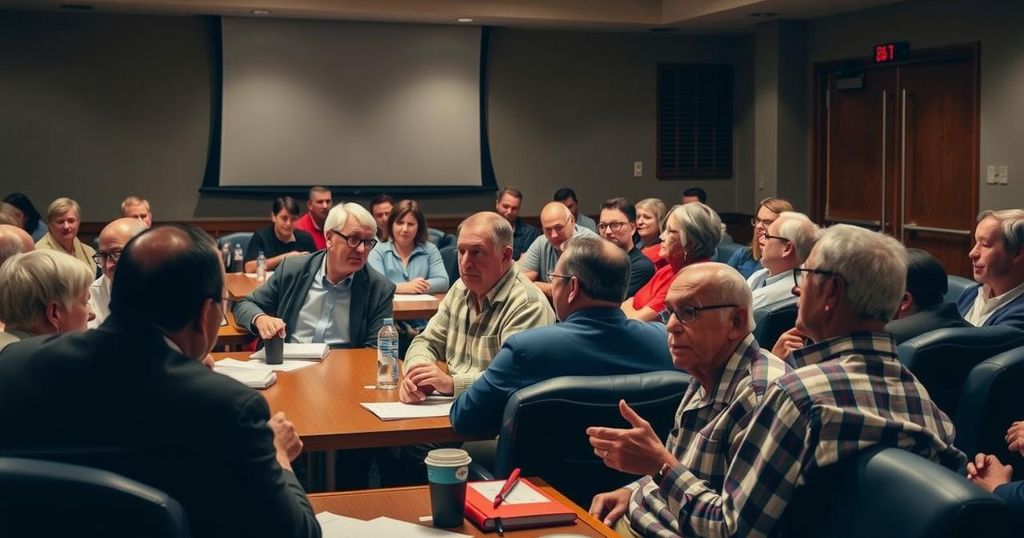Urgent Call for Climate Action: Beyond Funding at COP29
COP29 emphasizes the urgent need for decisive action against climate change as funding alone cannot remedy the environmental crisis. Bangladesh’s leadership showcases crucial advocacy for financial equity, sustainable practices, and the intersection of climate and mental health challenges. As global discussions highlight the critical threats to biodiversity and the human cost of climate change, enforcing tangible measures emerges as paramount for future sustainability.
As the urgent call to combat climate change resonates globally, COP29 in Baku revisits the pressing need for collective action. While discussions have persisted since the inception of the Conference of the Parties (COP) in 1995, significant slowdowns in progress on pivotal issues such as the establishment of a global climate fund highlight the inadequacies of merely allocating financial resources. This fund, while potentially beneficial, cannot reverse the irreversible damage already inflicted on our environment.
Climate change operates insidiously, manifesting as a chronic ailment that diminishes the health of our planet. The stark decline of species like Bangladesh’s national bird, the magpie robin, underscores the urgency of transformative action beyond financial investments. Ecosystem restoration and biodiversity protection necessitate concerted efforts that prioritize both immediate relief and long-term sustainability.
Bangladesh’s advocacy at international forums, notably at COP28, highlights the nation’s commitment to addressing climate-induced losses and damages. Securing a $700 million fund aligns Bangladesh with crucial discussions on equitable resource distribution, reinforcing the call for developed nations to fulfill their commitments, particularly the unfulfilled annual allocation of $100 billion for climate action.
The escalating physical repercussions of climate change are evident in Bangladesh, where sea-level rise and extreme weather events disrupt agricultural practices and threaten food security. The adverse outcomes extend beyond environmental factors, encompassing public health issues that stem from poor air quality and water contamination, highlighting the severe human cost of climate inaction.
Mental health repercussions, vividly documented by various studies, emerge as critical concerns tied to environmental changes, with communities experiencing anxiety, depression, and heightened emotional distress. It is imperative to engage vulnerable demographics, including women, children, and indigenous populations, in the discourse surrounding climate resilience and mental health support.
Biodiversity, an essential pillar for ecological balance, faces unprecedented threats that demand immediate attention. Research indicates that climate refuges—critical habitats for species survival—are rapidly diminishing. Bangladesh, alongside other countries, must align with global conservation initiatives to safeguard biodiversity while promoting sustainable practices within its communities.
The stark reality of climate inaction is increasingly apparent as the planet grapples with a 1.1°C rise in temperatures since industrialization. The COP29 discussions carry significant weight in shaping actionable strategies, especially as some leaders prioritize economic lenience over urgent climate commitments. This disconnect reveals an alarming gap between proclaimed intentions and tangible outcomes, particularly among high-emission nations, while countries like Bangladesh bear the brunt of environmental ramifications.
The juxtaposition of COP29 and the G20 Summit reflects the continuing struggle for prioritization of climate strategies in global dialogues. While the G20 supported climate finance rhetoric, critiques arose regarding the reliance on loans instead of grants for vulnerable nations, raising questions about the effective mobilization of promised resources.
Looking forward, viable solutions lie within reach, including transitions to clean energy, innovations in emission reductions, and investments in ecological restoration. Bangladesh’s proactive stance at COP29 serves as an emblem of collaborative efforts necessary to enact sustainable change. The fight against climate change obliges us to transcend financial discourse and implement measures here empathy, accountability, and a fundamental shift in how humanity values its shared environment. The consequences of inaction will indelibly affect our planet for generations to come.
The need for urgent climate action is underscored by worsened weather events and the gradual decline of ecosystems. COP29 serves as an international forum for addressing the stark repercussions of climate change, particularly for vulnerable countries like Bangladesh, which face daunting challenges from rising sea levels and erratic weather patterns. Global discussions are critical in bridging the gap between funding promises and actionable commitments, pushing for a holistic approach that involves environmental restorative practices alongside equitable financing strategies. In light of potential mental health crises due to climate distress, the response to climate change is intricate and multi-faceted, requiring diverse engagement across social strata and recognition of environmental rights.
The challenge of climate change requires far more than financial assistance; it calls for genuine commitment to implementing enforceable environmental policies. As the world confronts the ramifications of climate inaction, it is essential to learn from the experiences of nations like Bangladesh, which advocate for equitable funding and active responses to climate impacts. Global forums must translate discussions into actions that prioritize environmental restoration, sustainability, and mental health resilience, ensuring a more sustainable future for all. In essence, combating climate change is a collective responsibility necessitating immediate and sustained efforts at every level of society.
Original Source: www.newagebd.net




Post Comment